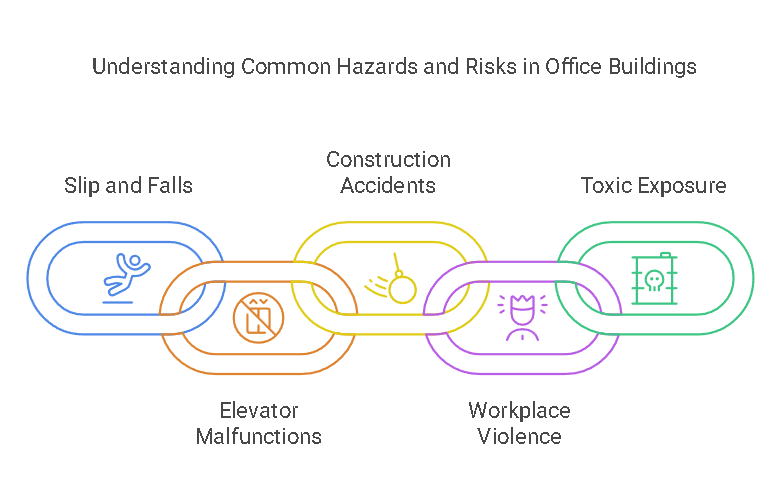Office building accidents can turn a typical workday into a life-changing event. These incidents, often overlooked, can lead to severe injuries, financial strain, and emotional distress. If you or a loved one has been injured in an office building accident, understanding your rights and options is crucial.
We are certified office building accident lawyers who can help you clarify your rights. We help explore your legal options and secure the compensation to get back on your feet!
How Our Legal Counsel Can Benefit You
Office building accidents can be complicated. The legal process can be overwhelming, mainly when you are dealing with physical and emotional damage. Chicago Injury Lawyer will work relentlessly to maximize your compensation by actively listening to your case.
Here’s how our lawyers for personal injury will be helpful:
- Investigating the Tragic Event: Our lawyers will gather evidence, speak with witnesses, and consult experts to build a solid case.
- Dealing with Insurance Companies: Our attorney can handle negotiations with insurance companies to ensure you don’t settle for less than you deserve.
- Filing Claims and Lawsuits: Our lawyer will help you file the necessary workers’ compensation claims, premises liability claims, or personal injury lawsuits.
- Fighting for Your Rights: Our injury lawyers in Chicago will take your case to court and fight for your right to compensation.
Accidents in Office Buildings: The Common Types
While seemingly safe, office buildings can create dangers that lead to accidents. These dangers can result in significant injuries, from slippery floors to faulty equipment. Here are the most common types of office building accidents:
1. Slip and Fall Accidents
One of the most common accidents in office buildings is slipping, tripping, or falling. Hazards like wet floors, uneven carpets, loose wires, or dimly lit hallways can cause people to fall and suffer injuries. These injuries can range from broken bones to head trauma or sprains.
2. Elevator and Escalator Malfunctions
Elevator accidents also occur frequently in office buildings. These can include elevators that drop suddenly, get stuck, or experience other malfunctions. The result can be severe injuries like fractures, crushing injuries, or even fatalities.
3. Construction Site Accidents
Workers and even office visitors may be at risk when office buildings undergo construction. Common accidents include scaffolding collapses or falling debris. People may be injured if construction zones are not correctly marked or secured.
4. Workplace Violence
While less common, workplace violence is a significant issue in some office buildings. This can include physical altercations, assaults, or even shootings. Illinois law requires employers to take steps to prevent workplace violence, but incidents still happen.
5. Toxic Exposure
Older office buildings may have environmental hazards such as asbestos, mold, or poor ventilation. Prolonged exposure to these dangerous substances can cause serious health problems, like chronic respiratory issues, skin conditions, or even cancer.
6. Electrical Hazards:
Exposed wiring or faulty appliances may result in burns or electrical shocks.
7. Falling Objects
Falling objects can be dangerous in offices, especially during construction or renovation projects. These might include ceiling tiles, heavy tools, or equipment. Such accidents can lead to severe injuries like head trauma, fractures, or cuts and bruises.

Common Injuries Office Building Accident Victims Encounter
According to OSHA, elevator and escalator incidents cause over 17,000 injuries annually in the U.S., including in workplaces and offices.
Here are some common injuries people face after office building accidents and their consequences:
- Fractures (Broken Bones): Often caused by slip-and-falls, fractures can require months of recovery and may lead to long-term mobility issues.
- Sprains and Strains: Particularly in the wrists, ankles, or back, these injuries can limit physical activity and job performance.
- Traumatic Brain Injuries (TBIs): As a result of falls or being struck by falling objects, TBIs can cause memory loss, cognitive difficulties, and permanent disability.
- Spinal Cord Injuries: Severe accidents may lead to paralysis or chronic back pain, significantly altering a victim’s lifestyle and earning capacity.
- Neck Injuries (Whiplash): Sudden jolts from elevator malfunctions or falls can result in debilitating neck pain and restricted movement.
- Lacerations and Contusions: Deep cuts or bruising caused by sharp objects or hard impacts may lead to infections or permanent scarring.
- Burns: Electrical hazards or fires in office buildings can cause burns requiring extensive medical treatment and rehabilitation.
- Electrocution Injuries: Exposed wiring or faulty equipment can result in nerve damage, burns, or cardiac issues.
- Eye Injuries: Debris or chemical exposure may lead to temporary or permanent vision loss.
- Crush Injuries: Collapsing structures or malfunctioning equipment can severely damage muscles, nerves, and bones.
- Knee and Joint Injuries: Slip-and-falls often result in torn ligaments or damaged cartilage, necessitating surgery or long-term therapy.
- Shoulder Injuries: Falls or lifting heavy objects can cause rotator cuff tears, severely limiting arm movement and strength.
- Internal Injuries: Blunt force trauma from falls or being struck by heavy objects may damage internal organs, requiring immediate medical attention.
- Chronic Pain Syndromes: Injuries that fail to heal correctly may lead to ongoing pain, reducing quality of life and work capacity.
- Emotional and Psychological Injuries: Anxiety, depression, or PTSD can develop after traumatic office building accidents, impacting daily life and relationships.
Steps to Take After an Office Building Accident
If you’ve been injured in an office building, take the following steps immediately. It can significantly impact your ability to recover compensation:
- Seek Immediate Medical Attention: Your health and safety come first. Prompt medical care also creates a record of your injuries.
- Report the Incident: Notify your employer or the building’s management about the accident.
- Document the Scene: Take photos of the hazard that caused your injury and your injuries themselves.
- Gather Witness Information: Collect contact details from anyone who saw the accident.
- Consult a Chicago Office Building Accidents Lawyer: Legal guidance can ensure your rights are protected from the start.

Illinois Laws Protecting Office Building Accident Victims
When an accident occurs in an office building, the injured party may have the right to pursue compensation for their injuries. In Illinois, several laws and compensation acts are designed to protect the rights of accident victims. Such as:
1. Illinois Workers’ Compensation Act
If you are an employee injured while on the job in an office building, the Illinois Workers’ Compensation Act (820 ILCS 305) provides a no-fault system for obtaining compensation. Under this act, you don’t have to prove that your employer was negligent to receive benefits.
The Illinois Workers’ Compensation Act covers a variety of expenses for injured workers, including:
- Medical expenses for treatment, surgeries, medications, and rehabilitation
- Lost wages for the time you are unable to work due to your injury
- Permanent disability benefits if your injury causes lasting impairment
- Death benefits for families of workers killed in workplace accidents
2. Illinois Premises Liability Law
Under Illinois Premises Liability Law (740 ILCS 130/1), property owners must maintain a safe environment for anyone who enters their property. This includes office building owners who must ensure their buildings are free from dangerous conditions that could lead to accidents.
3. Illinois Personal Injury Law
In cases where an office building accident results from the negligence of a third party, you may have grounds to file a personal injury lawsuit. Under Illinois personal injury law (735 ILCS 5/13-202), you can seek compensation for damages such as:
- Medical bills
- Pain and suffering
- Lost wages
- Emotional distress
4. Illinois Product Liability Law
If your injury was caused by a defective product, such as a faulty elevator, malfunctioning office equipment, or defective appliances in the building, you may have a claim under Illinois Product Liability Law (735 ILCS 5/2-621).
Product liability law holds manufacturers, distributors, and retailers accountable for defects in the design, manufacturing, or sale of products that cause injury. In these cases, you may be able to recover damages for:
- Medical treatment
- Pain and suffering
- Lost income
- Property damage
Statute of Limitations Regarding Chicago Office Building Accidents
The statute of limitations refers to the legal time limit for filing a lawsuit after an injury. If you don’t file within the required timeframe, you risk losing your right to pursue compensation.
For office building accidents in Chicago, the statute of limitations is typically:
- Two years for personal injury claims.
- Two years for product liability claims.
- Three years for claims related to workplace injuries under certain circumstances.
It is crucial to consult with a skilled office building accident lawyer like ours as soon as possible after an accident. It will ensure you meet these deadlines and preserve your right to compensation.
Your Justice Journey Starts Here!
An office building accident can disrupt your life in unimaginable ways. But remember, you don’t have to face this challenge alone. We are here to fight for your rights and guide you every step of the way.
Your journey to justice begins with a single step. Contact our office today for a free consultation. Let’s turn your setback into a comeback!
Frequently Asked Questions
Can I sue my employer for an office building accident?
If you are an employee injured on the job, you will typically file a workers’ compensation claim. Generally, workers’ compensation laws prevent employees from suing their employer, but exceptions may apply.
Can I file a claim if I was injured in an office building as a visitor?
Yes, if the building owner or occupant was negligent in maintaining a safe environment, you may be entitled to compensation through a premises liability claim.
What if the building owner denies responsibility?
If the building owner denies responsibility, a lawyer can investigate the situation, collect evidence, and build a case to establish liability. This may include reviewing maintenance records, inspecting the property, and identifying any violations of safety regulations.



